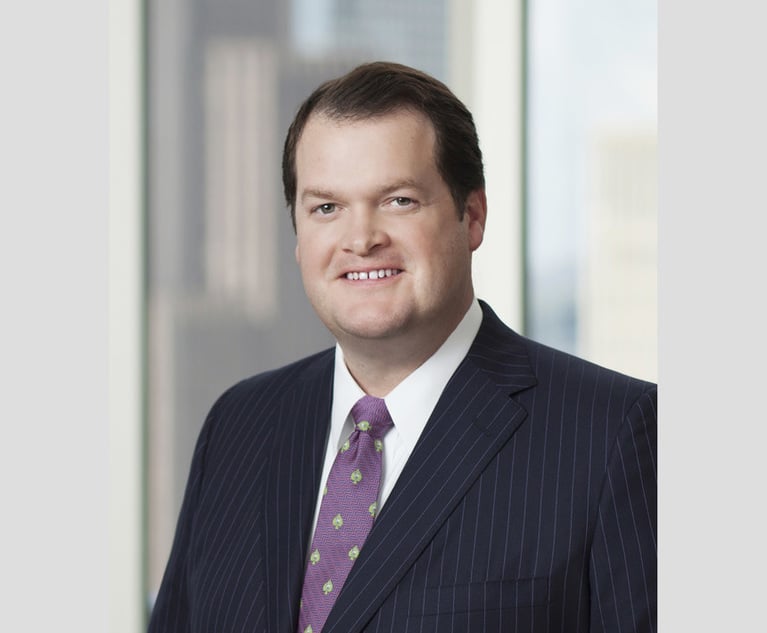Partner Exits, Compensation Shifts Keep Lockstep Firms Under Pressure
It takes a lot to lure top partners from elite, lockstep law firms such as Cravath, Swaine & Moore. Unfortunately for the lockstep firms, some of their rivals have a lot to offer.
March 23, 2018 at 12:20 PM
7 minute read
The original version of this story was published on New York Law Journal

Recent partner defections—combined with aggressive lateral hiring by ambitious rival firms—have reignited a familiar debate: Will lockstep partner compensation at some of the industry's most elite law firms become a relic of the past?
Partner exits from Cravath, Swaine & Moore and Debevoise & Plimpton in the past two years have raised fresh questions about the sustainability of the lockstep system, a rigid compensation regime based on seniority rather than a partner's revenue stream.
In recent months, meanwhile, Simpson Thacher & Bartlett changed its partner compensation model by broadening its pay spectrum, said three sources familiar with the firm, in a bid to retain and attract talented partners. So far in 2018, the firm has brought in two Latham & Watkins partners and a senior executive at JPMorgan Chase & Co.
Simpson Thacher had already tinkered with compensation more than three years ago, when the firm lured back initial public offering specialist Joshua Bonnie ahead of his planned departure for Kirkland & Ellis, reportedly giving him a raise.
A spokesman for Simpson Thacher and the firm's chairman, William Dougherty, did not return messages seeking comment about the more recent shift.
The compensation changes by Simpson Thacher and others, including over the years by Magic Circle firms that have struggled to compete with U.S. firms, have come amid increasingly bold lateral hiring efforts by larger, nonlockstep firms with top-shelf corporate practices, such as Kirkland. (This week The American Lawyer reported that Kirkland generated $3.17 billion in revenue in 2017, rocketing to the top of the Am Law 100 and surpassing Latham & Watkins.)
In January Eric Schiele became the third Cravath partner to jump to Kirkland in recent years, after Sarkis Jebejian in 2012 and Jonathan Davis in late 2016. Schiele had worked alongside Cravath presiding partner Faiza Saeed on some of the firm's largest recent deals, including representing Disney in its pending $66 billion acquisition of 21st Century Fox and representing Time Warner on its pending $109 billion sale to AT&T, a deal that became embroiled in antitrust litigation.
Paul, Weiss, Rifkind, Wharton & Garrison, meanwhile, may have caught the biggest rainmaker departing from Cravath when it hired M&A superstar Scott Barshay in 2016.

Cravath isn't the only lockstep firm to see its partners lured by outsized compensation elsewhere.
Kirkland also blew up the compensation package of fund formation expert Erica Berthou, multiplying what she was earning at Debevoise & Plimpton, said two sources familiar with her move.
A Kirkland spokeswoman declined to comment about the firm's recruiting strategy and Berthou's move. A Debevoise spokesman also declined to comment.
'Antiquated' System?
While Cravath, which will celebrate its 200th anniversary next year, has periodically altered the speed of the partnership compensation curve, it has remained committed to the lockstep compensation model, stamping out any discussion of changes after prominent exits.
In a statement to ALM, Cravath said its “system encompasses our approach to talent development, client service and compensation. It is the foundation of our collaborative culture, and it drives the consistency in quality across our platform that enables us to deliver the best advice to our clients in their most challenging matters.”
Other U.S. firms that retain a similar seniority-based pay system include Davis Polk & Wardwell; Cleary Gottlieb Steen & Hamilton; and Wachtell, Lipton, Rosen & Katz.
Legal industry observers and leaders at nonlockstep firms said it is getting harder for firms to maintain rigid compensation structures given ever-intensifying competition to attract and retain clients and the best talent—and the departures are an indication of that stress.

“Today, more than ever, clients are hiring individual lawyers from top-tier firms, rather than [simply hiring] firms. This puts the top lawyers in very high demand, with firms willing to pay top dollar to recruit them. Logically, this presents a challenge for firms tied to lockstep compensation,” said Barry Wolf, executive partner at Weil, Gotshal & Manges.
Janet Stanton, a law firm consultant at Adam Smith Esq, said the notion of lockstep compensation in any other business “would be bizarre.” Departures from lockstep firms show market forces operating on “what to me is an antiquated system,” Stanton said.
The pressure is ratcheting up every year, she said. “You've got some powerhouses, mostly U.S.-based law firms, that have a lot of money and are highly profitable and they can go after these people with very impressive pay packages,” she said.
Stephen Fraidin, a former senior partner at Kirkland who is now vice chairman at Pershing Square Capital Management hedge fund, said that once strong loyalty between law firms and institutional clients began to break down and lateral movement increased, the attraction of predictable but limited compensation diminished.
“Lawyers who had been successful in developing strong relationships with clients realized they could move to other law firms and bring with them those clients and get more than they were being paid on a lockstep basis,” he said. “So it became harder to maintain the lockstep compensation model.”
Those lockstep firms that also have large unfunded retirement plans for partners are more vulnerable to departures, some industry observers said. Some Wall Street firms have mandatory retirement ages and unfunded pension plans, giving a portion their profits to retired partners.
Making a Statement
One oft-cited virtue of lockstep compensation is that lawyers are not tempted to hoard matters for themselves and can refer a case to a firm colleague who has the most experience and expertise for the matter. The system “ensures that clients will always get the best possible advice on their matter,” Cravath boasts on its website. “Firm clients are Cravath clients, not the client of one particular partner. As a result of the lockstep structure, two partners will never disagree over origination credits, as none exist.”
In response, critics to the system say lockstep isn't a prerequisite for a collegial environment, and management can find other, effective ways to encourage cooperation among partners.
But David Barnard, a consultant to Am Law 100 firms as a founding partner of Blaqwell, said he believes the lockstep system will survive at a few select firms. Barnard, formerly a Linklaters partner in New York, noted that in many continental European firms, the lockstep system thrives.
For some firms, “there comes a time when lockstep is not an appropriate compensation model, but for other firms, where their practice remains a more traditional practice—and these are typically the highest-end firms—lockstep is a perfectly good system of compensation,” he said.
“It's a statement of who they are, it's a statement of belief that they can survive with that compensation system and it produces an equitable result for their partners and their clients,” Bernard added. “They have the brand, quality, and it's very much part of their culture. And they're rich enough.”
This content has been archived. It is available through our partners, LexisNexis® and Bloomberg Law.
To view this content, please continue to their sites.
Not a Lexis Subscriber?
Subscribe Now
Not a Bloomberg Law Subscriber?
Subscribe Now
NOT FOR REPRINT
© 2025 ALM Global, LLC, All Rights Reserved. Request academic re-use from www.copyright.com. All other uses, submit a request to [email protected]. For more information visit Asset & Logo Licensing.
You Might Like
View All
Paul Hastings, Recruiting From Davis Polk, Adds Capital Markets Attorney
3 minute read

Perkins Coie Lures Former Longtime Wilson Sonsini Tech Transactions Partner

Trending Stories
Who Got The Work
J. Brugh Lower of Gibbons has entered an appearance for industrial equipment supplier Devco Corporation in a pending trademark infringement lawsuit. The suit, accusing the defendant of selling knock-off Graco products, was filed Dec. 18 in New Jersey District Court by Rivkin Radler on behalf of Graco Inc. and Graco Minnesota. The case, assigned to U.S. District Judge Zahid N. Quraishi, is 3:24-cv-11294, Graco Inc. et al v. Devco Corporation.
Who Got The Work
Rebecca Maller-Stein and Kent A. Yalowitz of Arnold & Porter Kaye Scholer have entered their appearances for Hanaco Venture Capital and its executives, Lior Prosor and David Frankel, in a pending securities lawsuit. The action, filed on Dec. 24 in New York Southern District Court by Zell, Aron & Co. on behalf of Goldeneye Advisors, accuses the defendants of negligently and fraudulently managing the plaintiff's $1 million investment. The case, assigned to U.S. District Judge Vernon S. Broderick, is 1:24-cv-09918, Goldeneye Advisors, LLC v. Hanaco Venture Capital, Ltd. et al.
Who Got The Work
Attorneys from A&O Shearman has stepped in as defense counsel for Toronto-Dominion Bank and other defendants in a pending securities class action. The suit, filed Dec. 11 in New York Southern District Court by Bleichmar Fonti & Auld, accuses the defendants of concealing the bank's 'pervasive' deficiencies in regards to its compliance with the Bank Secrecy Act and the quality of its anti-money laundering controls. The case, assigned to U.S. District Judge Arun Subramanian, is 1:24-cv-09445, Gonzalez v. The Toronto-Dominion Bank et al.
Who Got The Work
Crown Castle International, a Pennsylvania company providing shared communications infrastructure, has turned to Luke D. Wolf of Gordon Rees Scully Mansukhani to fend off a pending breach-of-contract lawsuit. The court action, filed Nov. 25 in Michigan Eastern District Court by Hooper Hathaway PC on behalf of The Town Residences LLC, accuses Crown Castle of failing to transfer approximately $30,000 in utility payments from T-Mobile in breach of a roof-top lease and assignment agreement. The case, assigned to U.S. District Judge Susan K. Declercq, is 2:24-cv-13131, The Town Residences LLC v. T-Mobile US, Inc. et al.
Who Got The Work
Wilfred P. Coronato and Daniel M. Schwartz of McCarter & English have stepped in as defense counsel to Electrolux Home Products Inc. in a pending product liability lawsuit. The court action, filed Nov. 26 in New York Eastern District Court by Poulos Lopiccolo PC and Nagel Rice LLP on behalf of David Stern, alleges that the defendant's refrigerators’ drawers and shelving repeatedly break and fall apart within months after purchase. The case, assigned to U.S. District Judge Joan M. Azrack, is 2:24-cv-08204, Stern v. Electrolux Home Products, Inc.
Featured Firms
Law Offices of Gary Martin Hays & Associates, P.C.
(470) 294-1674
Law Offices of Mark E. Salomone
(857) 444-6468
Smith & Hassler
(713) 739-1250









